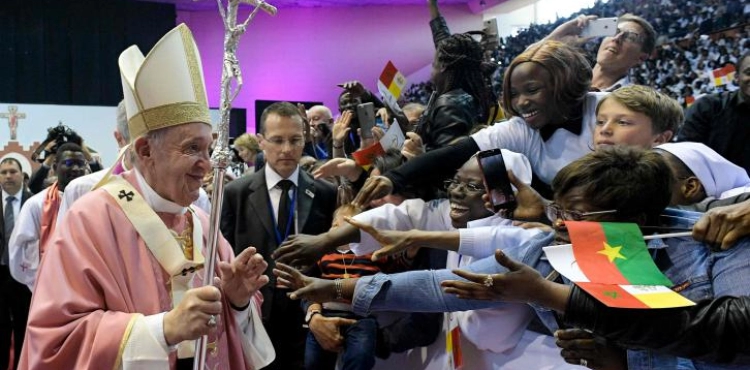Pope Francis of Rabat on Sunday held a mass rally attended by thousands of worshipers at the end of his official visit to Morocco, which was marked by the call for interfaith dialogue and the protection of migrants, as well as a warning to the Christians of Morocco to carry out missionary activities.
On the second day of his visit, the Pope met with Christians, where he met with bishops and nuns at the Cathedral of Rabat, before presiding over a mass in the stadium Moulay Abdellah.
The pope urged the worshipers to "continue to develop a culture of mercy," adding that "the tendency to believe that hatred and revenge are legitimate forms of justice in a swift and effective manner is always threatening us."
Some 10,000 people attended the mass, mostly from sub-Saharan Africa, as well as Europeans and Asians.
Morocco hosts a small Christian minority of between 30,000 and 35,000. Sub-Saharan Africans make up the vast majority of them and practice their rituals freely, while Christian converts from Moroccans are forced to hide.
The worshipers chanted French songs on African rhythms waiting for the pope to arrive, waving small flags to Morocco and the Vatican, while others chose to raise the flags of their countries of origin, such as Liberia, Lebanon and Italy.
The ceremony was attended by Minister of Foreign Affairs and Cooperation Nasser Bureita, Minister of Islamic Affairs Ahmed Al-Tawfiq, Interior Minister Abdul Wafi Al-Fatit, and the head of the Jewish community in Morocco, Serge Berdigo.
Choral chants led to about 500 chants and chants from across the country.
"It seems that all the Ivorians living in Morocco gathered here," said the 26-year-old immigrant from the Ivory Coast, Rabat-based Vicki, who expressed his "great pleasure" in seeing the pope directly.
The 18-year-old immigrant from Burkina Faso feels "profoundly affected" by the Pope´s vision. "I have been waiting for this moment," says the young man who dreams of crossing into Europe.
On Saturday evening, the Pope met with immigrants at the center of the Charitable Charitable Society of Caritas, where he stressed "the right of every human being to ensure his future," condemning "mass forms of deportation."
Morocco has become a major route for the migration of sub-Saharan migrants to Europe. In 2018, Moroccan authorities foiled some 89,000 immigration attempts, including 29,000 at sea, according to official figures.
On Sunday, Pope Francis visited a charity run by nuns and volunteers about 20 km (20 miles) south of Rabat. He met with children who were attending a health center in this association.
He then met with bishops and nuns at the Rabat Cathedral where he called on Christians in Morocco to strive "in the service of justice and peace, raising children and young people, and protecting and accompanying the elderly, the weak, the disabled and the oppressed."
Blessings and applause were received by bishops and nuns who came to the cathedral in the center of the capital from different cities and countries in West Africa, including those who took photographs of the anniversary with telephone cameras.
On the occasion, Pope Jean-Pierre Schumacher, 95, was the only surviving survivor of the Tepphren massacre in Algeria that killed seven monks in 1996 and has been living in Morocco since 2000.
"It is very important, it will remain in my memory," Schumacher told AFP.
In his speech at the Cathedral of Rabat, the Pope warned the Christians of Morocco to undertake any missionary activities. "The paths of the message do not pass through the missionary activities that always lead to a dead end," he said.
He went out of the text of his written speech to say, "Please do not preach!" "The number of Christians in this country is small, but this is not a problem in my view, although I realize that sometimes it is difficult to live for some," he said.
King Mohammed VI, in a speech on Saturday during the Pope´s reception at the historic Hassan mosque in the capital, renewed "faith in the protection of Moroccan Jews and Christians from other countries who live in Morocco."
The letter did not mention the presence of thousands of Moroccans who convert to Christianity and who are subject to prosecution if they convert to a religion other than Islam under a law criminalizing evangelization.
The law punishes between six months and three years´ imprisonment, each person "using the means of sedition to destabilize a Muslim faith or convert it to another religion."
Since 2017, a minority of Moroccan converts to Christianity has openly called for "legal recognition" and human rights activists and intellectuals have been demanding respect for "freedom of conscience" for years.
The officially unregistered "Coordination of Moroccan Christians" called on the authorities to ensure "fundamental freedoms from which they are still deprived" and to use the pope´s visit to discuss the freedom of conscience and religion of all Moroccans.
"The freedom of conscience and freedom of religion - not only freedom of worship, but also the right to live according to one ´s religious convictions - are closely related to human dignity," the pope said in a speech at the Hassan mosque in front of some 12,000 people.
Pope Francis´ visit to Morocco was marked by a joint appeal with the Moroccan monarch calling for the preservation of Jerusalem as a "common heritage" of the three monotheistic faiths.
Pope Francis left Morocco on Sunday afternoon, his third visit to an Arab country after Egypt and the United Arab Emirates. While the late Pope John Paul II visited the Kingdom in 1985.












